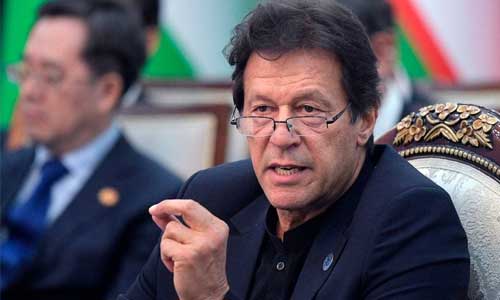Pakistan’s Prime Minister, Imran Khan, is set to visit Afghanistan this week, most probably on November 19. The trip is being made on the invitation of President Ashraf Ghani, at a very crucial juncture of Afghanistan’s history as the country faces ambiguities about its future and a stalled peace process. Imran Khan is expected to meet Ashraf Ghani and the head of High Council for National Reconciliation Dr Abdullah Abdullah and some other officials. It is important to see how the visit proceeds and what impacts, if any, it will have on the future of the stalled intra-Afghan talks and more importantly on the future of relations between the two countries.
For both Pakistan and Afghanistan, healing relations are a positive sign. As a matter of fact, for both of them, the alternatives are limited. There is no way they can negate each other, or keep on playing blame-game, as they have already witnessed the outcomes. They need honest and dedicated cooperation; and they need it now. The leadership in Pakistan say they have realized it, as they are supporting the Afghan peace process, and they whole-heartedly supported US-Taliban peace deal. After US-Taliban peace deal, the US Embassy in Islamabad acknowledged Pakistan’s role in a statement after US peace envoy, Zalmai Khalilzad visited Pakistan: “Ambassador Khalilzad expressed appreciation on behalf of the United States, especially the important role that Prime Minister Imran Khan and General Bajwa played in facilitating the start of the Afghanistan Peace Negotiations in Doha on Sept.12, and stressed the need for ongoing regional and international support for this historic opportunity for peace.” US-Taliban peace deal then led to the start of intra-Afghan peace talks.
However, there were indications that the US-Taliban peace deal was not as warmly welcomed by the administration in Kabul led by the Arg and President Ashraf Ghani. They believed they were not involved in the process sufficiently; nevertheless, they later approved the team that was formed for intra-Afghan talks in Doha, Qatar, and also the formation of HCNR under the leadership of Abdullah Abdullah. The talks, therefore, started in September and there were expectations that both the parties would reach to some agreement on the basic framework of talks before the US presidential election, but that did not happen. And, now after the victory of Joe Biden as the president, and the possible change of administration in Washington, the situation has turned hazier.
This ambiguity is costing Afghanistan a great deal, particularly, in the security sector as the fighting between the Taliban and Afghan forces has continued and mostly civilians are being victimized by it. Therefore, it is of great significance for Afghanistan that intra-Afghan talks must move in the right direction, and Pakistan can play an imperative role in this scenario.
Pakistan can use its influence on Taliban to at least announce a ceasefire while the talks are underway. Given the vehement announcement of support by civilian and military leadership in Pakistan for the Afghan peace process, it is possible that Pakistan can make attempts for such a purpose, provided that the Kabul administration makes such a request during the upcoming visit of PM Imran Khan.
More importantly, the requirement of the time is that the visit should start a new chapter in the Pak-Afghan relations, considering the political dynamics in the region, and the socio-economic challenges being raised by the COVID-19 pandemic. The political dynamics and developments in the region point at a heightened role to the regional countries in Afghanistan. The US role in the region may further diminish with the probable complete withdrawal of US forces from Afghanistan. Joe Biden, in his election campaign, has also mentioned such a withdrawal, though the process that he suggests may not be as abrupt and irresponsible as Trump suggests. Ultimately, the scenario demands for a more responsible role of the regional countries for the political and economic development in Afghanistan, in addition to the positive role of leadership in Afghanistan itself. And, it is difficult to doubt that Pakistan’s role is the key among them.
For Afghanistan’s economic stability as well, the improved trade relations with Pakistan remains indisputable. Afghanistan’s fruits, saffron and pine-nuts can find profitable markets in Pakistan; and it imports a large portion of its daily requirements from Pakistan. Moreover, through Pakistan, Afghanistan can reach to India and East Asia and most importantly to Arabian Sea which can then open myriads of opportunities for trade. Pakistan has already allowed Afghanistan access to Gwadar Port, which is an essential part of China-Pakistan-Economic Corridor (CPEC), a key regional initiative in the economic sphere.
For Pakistan, on the other hand, Afghanistan is the key to its access to Central Asian countries, their energy resources, especially to the projects like Turkmenistan-Afghanistan-Pakistan-India (TAPI) pipeline. Moreover, Afghanistan’s territory can be a key link between CPEC and Central Asian Economic Corridor (CAEC) another economic initiative of China’s Belt and Road Initiative (BRI). Utilizing such opportunities can assist Pakistan in overcoming the economic challenges it has been facing. Moreover, the security situation in Afghanistan can always have an influence on Pakistan; therefore, if the security deteriorates in Afghanistan, the most lethal impacts will be on Pakistan.
After accepting the indisputability of cooperation between Pakistan and Afghanistan in all sectors, it is imperative that both the countries must further heal their relations by having a forward-looking approach. Scratching the old wounds, will only wound new scratches. Therefore, the upcoming visit of Pakistan’s PM must mark a new resolve in their relations; otherwise, it will be another wasted opportunity for both the countries.
Home » Opinion » Imran Khan’s Visit to Afghanistan – An Opportunity to Mark a New Chapter
Imran Khan’s Visit to Afghanistan – An Opportunity to Mark a New Chapter
| Sajjad Aasim

